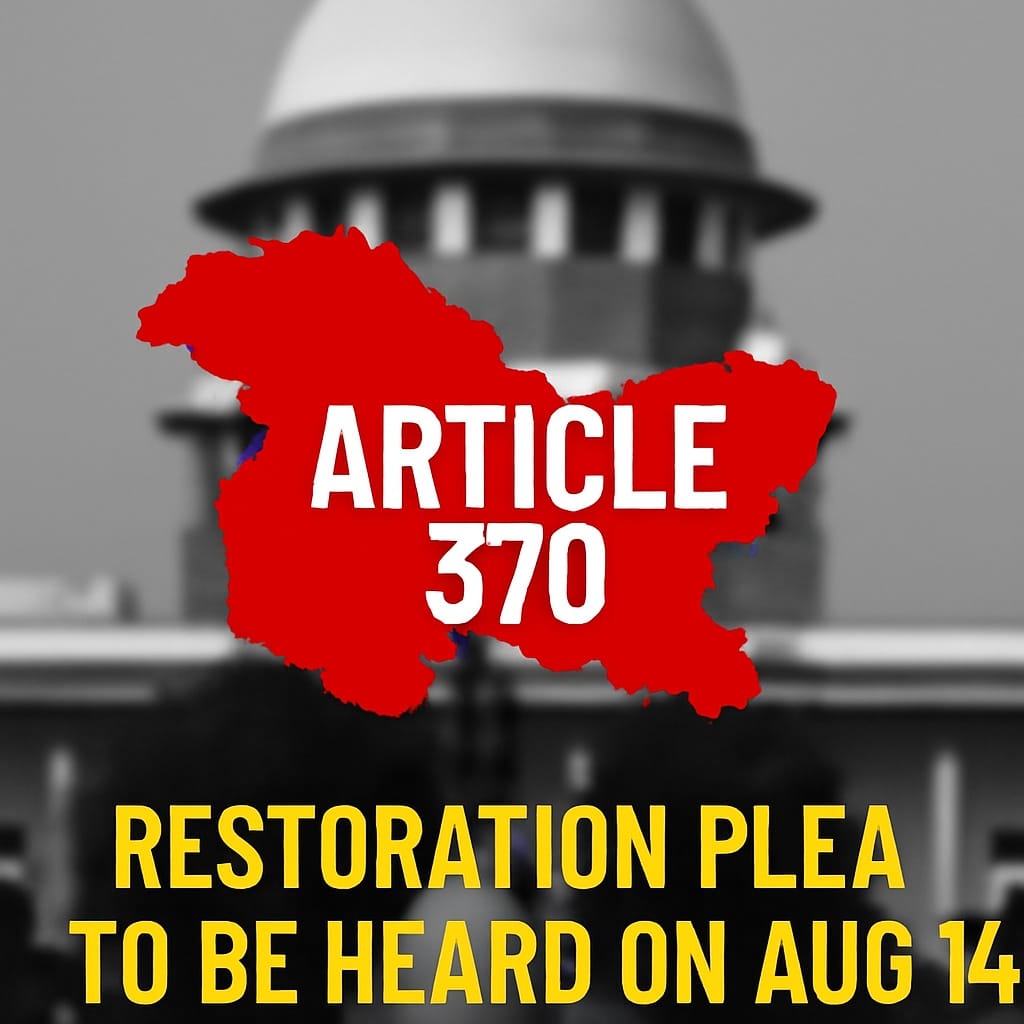Introduction
On August 14, 2025, the Supreme Court will once again turn its attention to Jammu & Kashmir’s long wait for the return of its statehood—a promise made but still unkept since the region’s political upheaval in 2019. The hearing was earlier set for August 8, a date heavy with symbolism as it marked six years since Article 370 was stripped away, but the court has now shifted it, Advocate Irfan Hafeez confirmed.
At the heart of the case are two petitioners—academician Zahoor Ahmad Bhat and activist Khurshaid Ahmad Malik—who believe that every extra day of delay chips away at India’s federal spirit. Their main contention was based upon the Supreme Court’s verdict of 2023, when it directed the Centre to restore J&K’s statehood “as earliest as possible.” For them, the wait has become more than a matter of governance and administration—it’s about fulfilling a constitutional promise and protecting the balance of power that lies at the heart and soul of India’s democracy.
A Plea for Federal Fairness
The petitioners—Zahoor Ahmad Bhat and Khurshaid Ahmad Malik—are not merely chasing a legal victory. They are pressing for something they believe is owed under the Constitution itself. In their petition, they argued that the delay in restoring statehood strikes at the root of federalism, which is considered as the foundational pillar of the Indian constitutional order.
For them, federalism means that states—no matter how politically sensitive or geographically distant—have the right to govern themselves within the Union framework. They remind the court that in December 2023, the Supreme Court, while upholding the abrogation of Article 370, clearly directed that J&K’s statehood must be restored “as soon as possible.”
But still, even after ten years, that promise remains unfulfilled.
The Restoration Promise & 2023 Judgment
To understand the weight of this petition, we have to return to the pages of 2023 Judgment where a five-judge Constitution Bench ruled that Parliament had the power to abrogate Article 370 and end J & K’s special status under the Constitution.
But while the court agreed with the government’s legal position, it also recognised the importance of statehood for democratic functioning. It relied on the Union government’s assurance that J&K would not remain a Union Territory indefinitely. The phrase “at the earliest” was meant to signal urgency.
For many in J&K, that assurance was the thin thread of hope tying them to the idea that, despite their special status being revoked, their voice in India’s federal democracy would be restored soon.
Why the Petitioners Say Delay is Unjustified
In their current plea, Bhat and Malik stress that there is no visible reason for further delay. They point to a relatively stable security situation, improved administrative control, and even the successful conduct of legislative elections—factors that, in the government’s own past reasoning, were prerequisites for restoring statehood.
In other words, the conditions the Centre once said it needed to restore full democratic governance are largely in place. And yet, the wait continues.
The petitioner stated that this is not just political procrastination, but a constitutional violation—arguing that keeping J&K under central rule for an extended period undermines the “basic structure” doctrine, which watches the core constitutional principles like democracy and federalism from being violated.
Why The Date of Aug 14 Matters
It carries its own importance. Falling just a day before Independence Day, it poses the question of J&K’s statehood within the broader lines of freedom, representation, and self-governance.
For people living in J&K, the symbolism is not at all avoidable: can a region truly feel part of a democratic union if it remains without the full rights and duties of a state?
Conclusion
On August 14, the Supreme Court’s options range from:
It can issue a time-bound directive for statehood restoration.
It can seek a status update from the Centre with or without immediate orders.
It may also reopen constitutional questions referred to in 2023.
Whatever the verdict, the hearing will unfold under the dual shadows of the 6th anniversary of Article 370’s removal and Independence Day, ensuring political overtones beyond the legal arguments.
For now, J&K’s statehood remains a constitutional promise unfulfilled—a reminder that in India’s federal democracy, the distance between judicial assurance and political action can be as wide as the Himalayan valleys it governs.
About the Author:
Sarika, an alumnus of Mody University of Science & Technology, Rajasthan, is an ardent learner having keen interest in Constitutional and Criminal Law. Through her academic journey and hands-on legal experience, she has developed a strong interest in legal research, policy analysis, and illustration.

